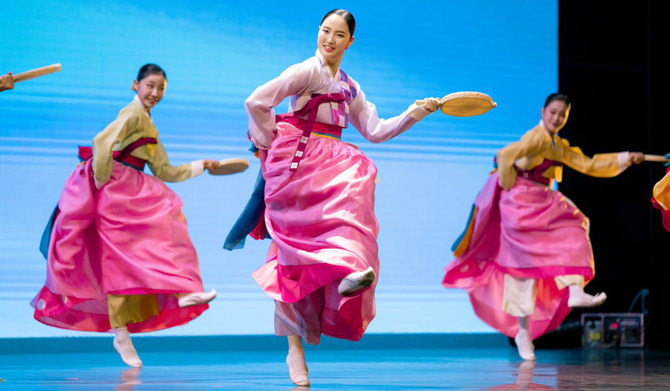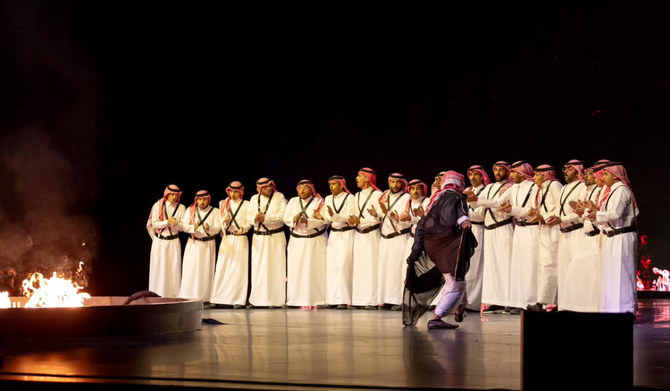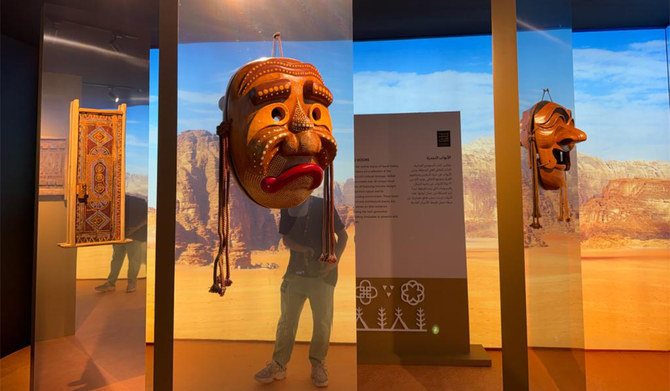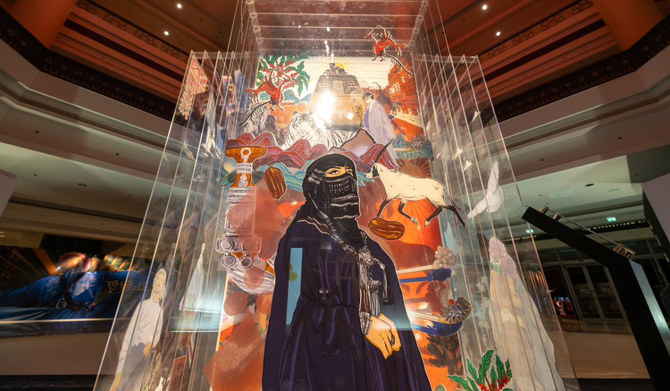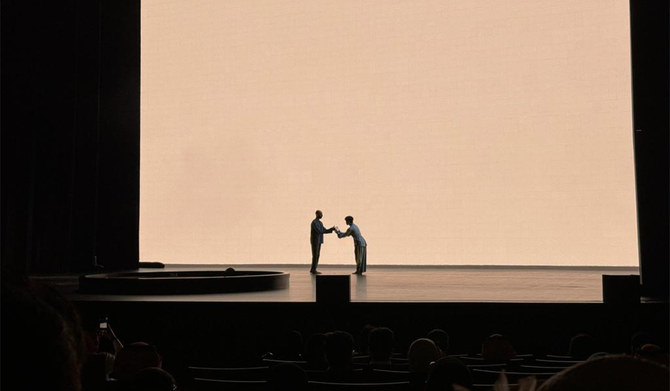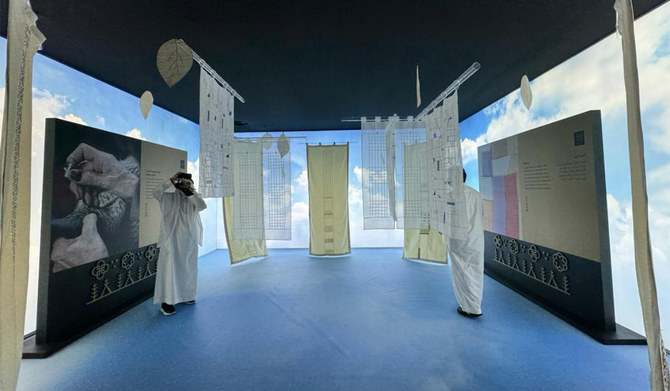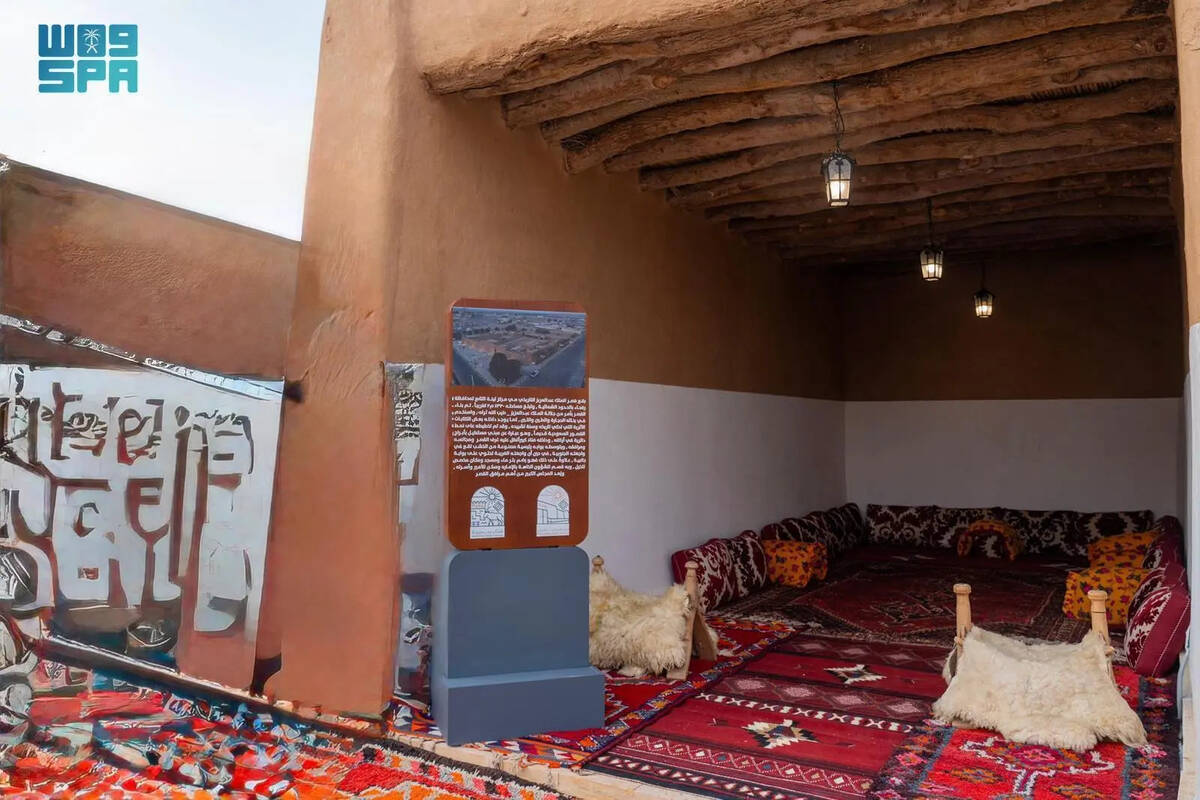RIYADH: Saudi Arabia and South Korea came together at the Red Hall in Princess Noura University Theater on Sunday night for a series of performances blending the two cultures.
The show, which will conclude on Nov. 28, was launched by the Saudi Royal Institute of Traditional Arts in partnership with the Korea National University of Arts.

‘Eltiqa,’ held in riyadh from nov. 26-28, was a cross-cultural artistic experience comprising 10 performances, five from each Saudi Arabia and Korea. (Supplied)
Suzan Al-Yahya, CEO of the institute, said that the show aims to promote “global cultural exchange in the Kingdom and create a meeting point between the traditional arts of various countries.”
The show, titled “Eltiqa,” features 50 artists from both the Saudi institute and South Korean university performing dances that celebrate the diversity of the two cultures and reflect a fusion of artistic sensibilities.
FASTFACTS
• ‘Eltiqa’ was launched by the Saudi Royal Institute of Traditional Arts in partnership with the Korea National University of Arts.
• It included an indoor exhibition exploring the two countries’ wooden handicrafts, textile arts, traditional art, and clay works.
The show opened with a Korean and Saudi performer meeting each other halfway across the stage and exchanging a letter, symbolizing the story of how the two nations met.

‘Eltiqa,’ held in riyadh from nov. 26-28, was a cross-cultural artistic experience comprising 10 performances, five from each Saudi Arabia and Korea. (Supplied)
This was followed by a cross-cultural artistic experience comprising 10 performances, five from each country.
The Korean performances showcased traditional royal court music and dances including the Three-Drum Dance, known in Korean as Samgomu.
It was an amazing performance, exceeding my expectations, and I felt close to the Korean audiences attending and seeing the two cultures merge.
Abdulaziz Taher, Riyadh-based artist
The last of the Korean performances included a traditional dance influenced by modern movements and musical rhythms.

‘Eltiqa,’ held in riyadh from nov. 26-28, was a cross-cultural artistic experience comprising 10 performances, five from each Saudi Arabia and Korea. (Supplied)
The five Saudi performances showcased dances from different regions of the Kingdom, reflecting the nation’s cultural diversity: Al-Samari, Al-Daha, Al-Liwa, Al-Khatwa, and Al-Khabiti.
Abdulaziz Taher, a Riyadh-based artist, said it was “hard to pick one favorite performance.”

Traditional Korean hairpins known as Binyeo are ornaments made from metal or horn. (Supplied)
He added: “It was an amazing performance, exceeding my expectations, and I felt close to the Korean audiences attending and seeing the two cultures merge.”
In between dances, a short theatrical performance depicted Saudi Arabia and South Korea coming together to overcome obstacles and celebrate their differences. It received a standing ovation from the audience.

The Hahoetal masks, showcased at Riyadh exhibition, are iconic symbols of Korean culture. (Supplied)
Raghed Al-Qahtani, a Saudi pharmacy student at Princess Nourah University, said: “The ending was the best part for me. It was beautiful seeing Saudis and Koreans taking turns and dancing to traditional Saudi and Korean music.”
The show accompanies the “Eltiqa” indoor exhibition, which explores the four elemental forces of earth, wind, fire, and water as they symbolize wooden handicrafts, textile arts, traditional art, and clay works, respectively.
An outdoor food area also offers visitors from both countries the chance to sample each other’s traditional cuisines.
King SeJong Institute, a Korean learning institute in Riyadh, participated in the show with freshly cooked kimchi-fried pancakes and kimbap, giving visitors an authentic taste of some of Korea’s best street food.
“Eltiqa” is part of the royal institute’s initiatives aimed at promoting cultural exchange in the Kingdom and preserving heritage in line with the strategic goals of Saudi Vision 2030.


